Canadian Mennonite
Winnipeg Assembly Special Report
July 7-9, 2008

Welcomed to Winnipeg
Winnipeg
Additional Resources |
Under projected words from Deuteronomy to be “a wise and discerning people,” delegates were welcomed to the ninth annual assembly of Mennonite Church Canada.
The first delegate session, held Monday afternoon, July 7, at Canadian Mennonite University, was dominated by reports from church leaders on the five major organizational parts of the national church budget.
General secretary Robert J. Suderman, speaking for the General Board, highlighted the new partnership covenant between the national and regional churches as an “historic agreement” and expressed gratitude for how it encouraged good will and collaboration between the various levels of the church structure. His six significant church issues were:
• How to best interpret the Bible;
• Pain in conversations about sexuality, particularly homosexuality;
• Growth due to conviction and commitment;
• The growing number of seniors;
• Being proactive in peacemaking; and
• Learning to relate “redemptively” to people of other faiths.
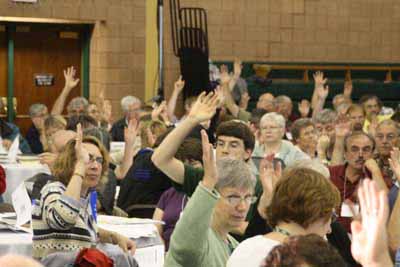 |
Sue Steiner and Dave Bergen, speaking for Christian Formation Council, told delegates about the recently completed major survey of present and former pastors (the subject of a full presentation later that day) and also called attention to the effects of the Baby Boom population bulge moving through the church, with an expected 11,000 church members (one-third of all members) turning 65 during the next five years.
“It is the multicultural dimension of our church that is the growing edge of our church,” said Christian Witness Council representative Janet Plenert, referring to the continued growth in new churches of non-European-background Mennonites. She pointed to new Vietnamese churches forming in Calgary, Alta., and Abbotsford, B.C.; a Burmese church in Surrey, B.C.; and multiple Spanish-speaking congregations starting in Quebec.
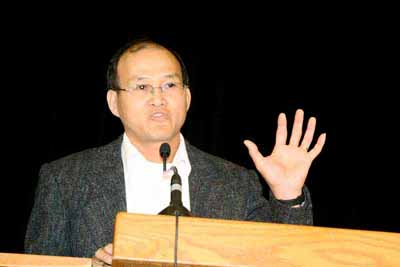 |
Plenert, the executive secretary of MC Canada Witness, also reported that the peace tax legislation discussed last year’s assembly was reintroduced to Parliament in October, but the bill hasn’t made it to second reading. “We invite all of you to continue to pressure your MPs to this end,” she said.
Pam Peters-Pries and Ed Janzen, speaking for Support Services, the operations arm of the church, encouraged delegates to use the 26 church videos now available through MC Canada’s YouTube video-sharing site and invited gifts to a new green building fund, used to do environmental retrofits, starting with low-flush toilets. They also announced details of next year’s assembly, which will be held in Saskatoon, Sask., from June 5–7, 2009, and which will use Colossians 3:12–17 as its theme text.
Randy Wiebe, director of finance, briefly described the several church groups and schools, mostly outside of Canada, to which MC Canada sends money through partnership arrangements. These are largely designated funds that are receipted by the church, but then passed onto designated agencies elsewhere.
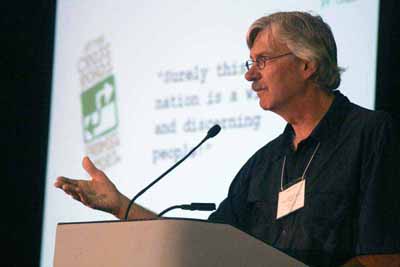 |
At an open floor time, delegates voiced concerns about the low funding for Mennonite Voluntary Service, expressed encouragement for youth internship programs, asked about whether membership was up or down overall (“Frankly we don’t have the exact statistics,” Suderman replied. “The impression and information we do have would point to that we are probably almost stable.”), and delighted but astonished to hear that North American Vietnamese Mennonites had planted 200 churches in Vietnam over the past 10 years, a figure that was confirmed.
Delegates also voted to approve the previous year’s actions by the national church’s General Board. They also thanked outgoing moderator Henry Krause with a lengthy round of applause for his six years of church service.
Quorum was easily met, with 328 congregational delegates present (200 are needed) and 33 area church delegates (21 are needed).
Church reports financial surplus
WINNIPEG
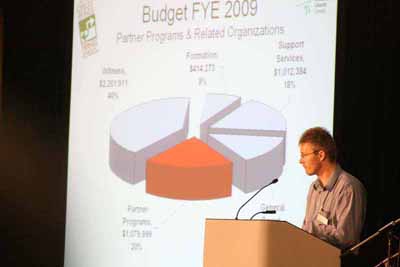 |
“Another year of clean bill of financial health,” was how Mennonite Church Canada director of finance Randy Wiebe summed up the national church’s financial life over the past fiscal year.
The audited financial statements show that both overall income and expenses were almost exactly the same as the previous fiscal year: $5.87 million in income and $5.76 million in expenses. The result was an operating expense surplus of $115,000, instead of an operating deficit of $69,000 that had been budgeted.
After a one-time gain from the sale of land, the church had a surplus of $152,000. Donations came in $83,000 higher than expected.
“Thank you to the congregations and individuals that have helped make possible our collective ministry during this last year,” Wiebe said.
Additional Resources |
The surplus was put towards reserves. Wiebe cautioned, however, that reserves were still lower than financially prudent.
Delegates voted to accept the audited financial statements. The budget will be considered in Tuesday’s delegate sessions.
Leaving . . . but mostly for good reasons
MC Canada survey indicates 36 percent of pastors will quit the ministry within the next five years
WINNIPEG
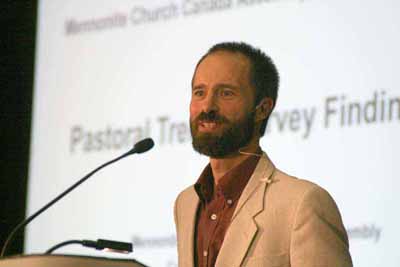 |
How can Mennonite Church Canada congregations encourage their current pastors, former pastors and past pastors? That was the question Dieter Schoenwetter asked delegates at MC Canada’s annual assembly, July 7, during the afternoon discernment session.
A social psychologist by profession, Schoenwetter gathered and interpreted the data from a pastoral trends survey sponsored by MC Canada in late 2007. Schoenwetter gave delegates an overview of the results, identified critical issues, and linked the MC Canada findings to similar findings in a 2006 survey conducted within the Canadian Conference of Mennonite Brethren Churches. More than 200 past and present pastors, or roughly 20 per cent of people who were sent the survey, responded.
While many pastors leave their position because of burnout, conflict or unclear expectations of their roles, Schoenwetter noted that more pastors leave for positive reasons, such as accomplishing their goals, advancing their career or changing roles, and continuing education.
One critical issue Schoenwetter noted was the need for more pastors, as MC Canada will lose 36 per cent of survey respondents alone within the next five years—not to mention those who will leave who did not respond to the survey.
“We are standing at the crossroads here,” Schoenwetter said.
Role clarification, spiritual support, attrition, congregational support, educational support and training, and holistic support—including the way pastors are let go—were key issues Schoenwetter identified.
He concluded his presentation by asking delegates to ponder questions like, “What makes fertile ground for pastoral formation?” He encouraged delegates to write their ideas regarding how they can encourage their pastors on yellow sticky notes. Delegates then attached the yellow sticky notes to posters lining the hall as they exited the Canadian Mennonite University gymnasium, where delegate sessions are taking place.
The ideas expressed by delegates on the yellow sticky notes will be shared in another session on July 8.
Gathering ‘green’
MC Canada tries to minimize environmental damage of national assembly
Winnipeg
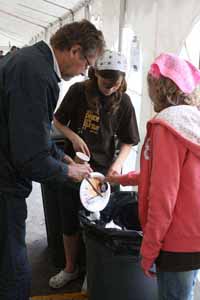 |
The Incredible Hulk isn’t the only thing going green this summer: Mennonite Church Canada is too.
“Greening the life of our church” was the second discernment item at MC Canada’s annual delegate assembly in Winnipeg on July 7. Robert J. Suderman, general secretary of MC Canada, opened the discussion by reminding delegates of an affirmation statement approved at last year’s assembly in B.C.
“Mennonite Church Canada believes that God longs for the well-being and health of the whole world, for all of creation is bound together and belongs to God,” Suderman said. He went on to praise the “unsung heroes” of creation care—older generations because they have demonstrated models of anti-materialism, and First Nations people because they have always shown the need “to walk gently and softly in nature.” He then delegates to acknowledge their contributions with a moment of silence.
Pam Peters-Pries, executive secretary of MC Canada Support Services, read the resolution passed at the 2007 assembly: “Whereas the earth is an expression of God’s love and Christ calls us to be stewards of God’s precious handiwork, be it resolved that Mennonite Church Canada develop guidelines to reduce the consumption of energy and other resources when planning future assemblies.” She then outlined some of the steps taken at the 2008 assembly in response to the resolution, including compostable dinnerware used at every meal and billeting options.
Additional Resources |
Peters-Pries noted the findings of one expert, who said more than 70 per cent of the environmental impact of an event takes place before it even starts—travel. This poses a problem for an assembly that happens every year and that encourages everyone to come, so Peters-Pries encouraged people to think about how many delegates they send, how often they send them, and how they send them.
The discernment period concluded with a 30-minute discussion at each table, during which delegates presented stewardship activities of their congregations—what they have done to green themselves, what some of the challenges of greening their congregations and the broader church are, and what possible solutions are to those problems.
Four delegates, each from a different church, reported on some of the ideas their tables had come up with. While “commuter congregations” and old buildings are a challenge to going green, some MC Canada churches have encouraged biking as a form of transportation, as well as composting, gardening, using low-energy light bulbs, sharing their sanctuary with other groups, and worshipping in the church basement where it is cooler, instead of using air conditioning.
At the end of the evening, the ideas were collected by assembly ushers. They will be distributed to MC Canada congregations at a later date.